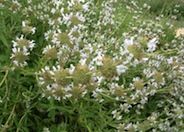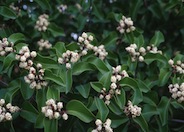
Common name:Black or Honey Sage
Botanical name:Salvia mellifera
This woody shrub has fragrant, dark green leaves with blue, white, or lilac flowers that bloom in the spring and summer.

Common name:Purple or Gray Sage
Botanical name:Salvia leucophylla
The Purple Sage is an evergreen shrub that grows 2'-3' tall and 5'-6' wide. It has white stems and leaves and light purple flowers that bloom between May and June. This shrub tolerates heat and drought. The Purple Sage is a California native.

Common name:California Sycamore
Botanical name:Platanus racemosa
The California Sycamore is a fast growing deciduous tree that reaches up to 40'-50' high. It tolerates heat, smog, as well as moist conditions; it is native to riparian areas. It can be drought tolerant once it's established if there is a high water table. It has interesting mottled bark when the tree is bare in winter. Leaves in fall are gold, red and orange, creating litter. It is beautiful all year round.

Common name:Sugar Bush
Botanical name:Rhus ovata
This dense, rounded evergreen shrub grows 8'-15' tall and wide, with creamy flowers between March and May. The shrub bears small red fruit. It grows well in inland areas and is drought tolerant. The foliage is leathery and rich looking and dark green in color. It needs additional water in low desert areas every 2 weeks or plant in area with afternoon shade. It needs a well drained site. It is susceptible to verticillium wilt in wet areas.
Dealing With Drought
More than half of the water used at your home is for outside purposes. Studies show that on average, half of the water used outdoors is wasted. The leading cause of waste is incorrectly set and poorly managed irrigation controllers. The second biggest cause of wastage is broken irrigation equipment that goes undetected. There are a few basic things you can do to make a big difference in your water use.
Click in the green box for more information
| Designer: Nan Simonsen Nanscapes | Distant Rocking Bench |
Photographer: GardenSoft |
Soils and Compost:
Physical weed control, including mulching, or hand removal protects the watershed from harmful chemicals.
Water Saving Tip:
Mulching and adding compost to soil can minimize evaporation and help soil absorb and store water.
Integrated Pest Management:
Remove irrigation water and fertilizer from areas where you don't want weeds to grow.

